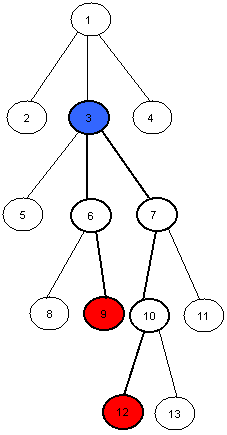LCA - Lowest Common Ancestor
A tree is an undirected graph in which any two vertices are connected by exactly one simple path. In other words, any connected graph without cycles is a tree. - Wikipedia
The lowest common ancestor (LCA) is a concept in graph theory and computer science. Let T be a rooted tree with N nodes. The lowest common ancestor is defined between two nodes v and w as the lowest node in T that has both v and w as descendants (where we allow a node to be a descendant of itself). - Wikipedia
Your task in this problem is to find the LCA of any two given nodes v and w in a given tree T.

For example the LCA of nodes 9 and 12 in this tree is the node number 3.
Input
The first line of input will be the number of test cases. Each test case will start with a number N the number of nodes in the tree, 1 ≤ N ≤ 1,000. Nodes are numbered from 1 to N. The next N lines each one will start with a number M the number of child nodes of the Nth node, 0 ≤ M ≤ 999 followed by M numbers the child nodes of the Nth node. The next line will be a number Q the number of queries you have to answer for the given tree T, 1 ≤ Q ≤ 1000. The next Q lines each one will have two number v and w in which you have to find the LCA of v and w in T, 1 ≤ v, w ≤ 1,000.
Input will guarantee that there is only one root and no cycles.
Output
For each test case print Q + 1 lines, The first line will have “Case C:” without quotes where C is the case number starting with 1. The next Q lines should be the LCA of the given v and w respectively.
Example
Input: 1 7 3 2 3 4 0 3 5 6 7 0 0 0 0 2 5 7 2 7 Output: Case 1: 3 1
hide comments
|
|
robosapien:
2020-06-03 13:21:24
Naive LCA : 0.38s :) |
|
|
brandonbreyers:
2020-05-27 11:21:06
I am getting SIGABRT error by using euler tour +rmq
|
|
|
pirate_joker1:
2020-05-25 09:03:26
Important:
|
|
|
manimanimani:
2020-05-15 21:29:24
probably the best problem for learning LCA! |
|
|
shrey_devep:
2020-05-14 15:51:33
Take Care of long long and for binary lifting intialisation of 2D lifting array Last edit: 2020-05-14 16:09:37 |
|
|
abid_jawad:
2020-04-03 21:35:49
maybe the constraint of N is wrong in the question, got wa, then simply submitted again by increasing the value of n, got ac |
|
|
fahimcp495:
2020-03-31 21:43:17
Required time for various technique using fast I/O:
|
|
|
bhavyarustgi10:
2020-03-31 08:00:17
What root we have to consider |
|
|
sagsango:
2020-03-30 14:03:48
Try it :-) https://www.codechef.com/problems/TALCA
|
|
|
manish_thakur:
2020-03-30 11:49:35
was getting compilation error due to some comments in the code, removed them and got AC! |
| Added by: | hossamyosef |
| Date: | 2013-05-13 |
| Time limit: | 0.600s-1.113s |
| Source limit: | 50000B |
| Memory limit: | 1536MB |
| Cluster: | Cube (Intel G860) |
| Languages: | All |
| Resource: | FCIS/ASU Local Contest 2013 |

 RSS
RSS